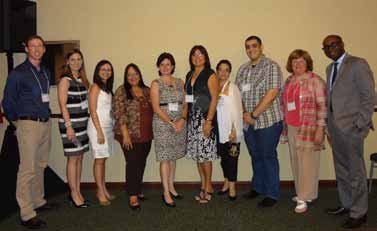
| Oct. 2013 | |||||||||||
| Top stories | |||||||||||
| In the news | |||||||||||
| Photos | |||||||||||
| Contact us | |||||||||||
| Archive | |||||||||||
|
Shared knowledge advances SCID screening in Puerto Rico |
A chance meeting at an international conference turned into an opportunity to help Puerto Rico implement a screening process for a potentially curable condition in babies.
At the Newborn Screening and Genetic Testing Symposium in May, Travis Henry, Ph.D., clinical lab analyst, made a presentation about an assay developed for severe combined immune deficiency (SCID). SCID is a rare inherited disorder caused by a deficiency or absence of cells that help fight infections.
 A message left in the sand of San
Juan beach by Travis Henry reads, "SHL Univ. of Iowa impacting the globe."
A message left in the sand of San
Juan beach by Travis Henry reads, "SHL Univ. of Iowa impacting the globe."
In 1997, Duke University found that at least 90 percent of babies born with SCID can be given a healthy immune system if they have a bone marrow treatment within three months of birth.
"This once-fatal disease should be now seen as a pediatric emergency, a condition that needs immediate diagnosis and treatment," Dr. Rebecca Buckley of Duke University School of Medicine said about the findings of the 15-year study. "What we're saying is that essentially every baby with SCID could be cured if diagnosed early enough. SCID should be considered a pediatric emergency."
Often referred to as the "bubble-boy disease," SCID was added to the core panel of 29 genetic disorders as part the Recommended Uniform Screening Panel in 2010. Since then, approximately 17 states - including Iowa - have started pilots or fully implemented screening for the condition. Because there was no uniform assay available, each state developed its own analytic laboratory procedures. Henry is part of the Hygienic Laboratory's molecular team that developed the assay for the Iowa Newborn Screening Program.
After Henry's presentation in May, Dr. Sherly Pardo-Reoyo of the Puerto Rico Newborn Screening Laboratory approached him to talk about the technical difficulties her lab was having with implementation of their SCID assay. That conversation led to Henry traveling to San Juan to help troubleshoot the US territory's SCID screening processes. This included implementation controls and quality assurance methods based on his extensive experience in the methodology of the SCID assay using real-time PCR. While there, Henry also made a presentation about SCID implementation at the Puerto Rico Newborn Screening Symposium on Oct. 5.
Approximately 48,000 babies are born in Puerto Rico each year compared to 40,000 born in Iowa. Puerto Rico's newborn screening faces significant financial challenges, Henry said, conducting screening for 8,000 more babies than Iowa with half the equipment and one-third of the staff.
 Travis Henry (far left) poses with members of the newborn
screening community at the Puerto Rico Newborn Screening
Symposium in May. With him are (from left) Jazmin
Rodriguez, Life Technologies; Sulay Rivera-Sanchez, Ph.D.,
associate director of Puerto Rico Newborn Screening (PR
NBS); Carmen Cadilla, Ph.D., of PR NBS molecular genetics;
Dr. Sherly Pardo-Reoyo, of PR NBS mass spec; Ledith Resto,
PR NBS genetic counselor; Nora Gavillan, PR NBS social
worker; David Santos, PR NBS IT specialist; Marcia Slater,
Life Technologies; and Jelili Ojodu, Association of Public
Health Laboratories Newborn Screening director.
Travis Henry (far left) poses with members of the newborn
screening community at the Puerto Rico Newborn Screening
Symposium in May. With him are (from left) Jazmin
Rodriguez, Life Technologies; Sulay Rivera-Sanchez, Ph.D.,
associate director of Puerto Rico Newborn Screening (PR
NBS); Carmen Cadilla, Ph.D., of PR NBS molecular genetics;
Dr. Sherly Pardo-Reoyo, of PR NBS mass spec; Ledith Resto,
PR NBS genetic counselor; Nora Gavillan, PR NBS social
worker; David Santos, PR NBS IT specialist; Marcia Slater,
Life Technologies; and Jelili Ojodu, Association of Public
Health Laboratories Newborn Screening director.
"I was extremely impressed with the quality of the program, given the financial restrictions," Henry said. "In addition, Puerto Rico is essentially a rural setting, with the exception of San Juan, which translates into significant increases in poor quality samples for screening. Second specimens must be collected to replace the poor quality first sample, and this process is performed at the NBS lab whenever possible. So, the lab functions as both a screening laboratory and a sample- collection clinic."
The Puerto Rico program, which includes its 80-year-old founder Pedro Juan Santiago-Borrero, plans to validate and characterize about 4,000 blood-spot specimens before beginning an implementation pilot, expected by year's end.
Henry encourages the scientific community not to underestimate the intelligence and dedication of those in less affluent areas.
"Intelligence is a quality that is not dictated by dollars," he said. "I was impressed by the abilities and resourcefulness of the newborn screen staff in Puerto Rico to be able to provide a level of care far above the financial means of the program. This ability to provide exceptional care can be directly attributed to the dedication of the amazing staff."